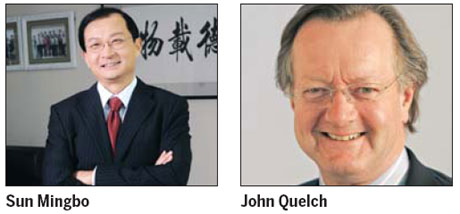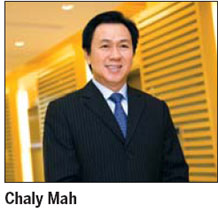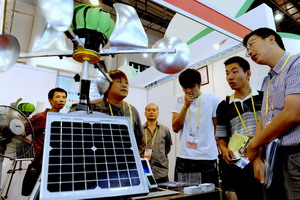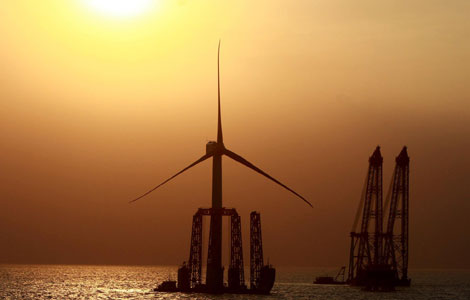Top execs: Crucial issues facing 'New Champions'
Updated: 2011-09-14 08:06
(China Daily)
|
|||||||||||



Editor's note: The 2011 Summer Davos forum will be held from September 14 to 16 in Dalian with the theme of "Mastering Quality Growth". Some top executives share their views on what the talking points will be:
Sun Mingbo, president of Tsingtao Brewery Co Ltd
In September 2007, Davos first went outside Switzerland and make a stop in Dalian.
Over the past five years, the world has undergone profound changes. But what remains unchanged is that Chinese companies, who actively participate in globalization, have been striving to explore possible new business patterns and opportunities in the "green" economy by redefining our development pattern and speed as well as meeting social needs through innovation in science and technology.
We are here to rebuild our confidence and seek solutions to uncertainties through communication and ideas.
We sincerely hope that we can draw strength from experiences in the development of other companies.
Our attitude to the future is:
"Whatever the changes, we will, as ever, be industrious and diligent in continuous reform, aiming to bring happiness to human life by presenting high-quality products to consumers from all corners of the world."
John Quelch, vice-president and dean of the China Europe International Business School
As China's stature on the world stage grows apace, the question is often asked - where are the Chinese global brands?
Today, there are no global Chinese brands. The domestic Chinese market offers tremendous expansion opportunities. Understandably, many companies focus on expanding locally rather than tackling unfamiliar overseas markets that are highly competitive.
But there will be Chinese global brands in the future, probably names that we do not yet know.
They will not be mere imitators of Western products or services. They will be visionary, innovative brands that solve important problems in ways that other companies cannot easily imitate. Innovation and continuous improvement will, as always, be key to building a sustainable global brand.
Johnny Chen, CEO of Zurich Financial's Non-life Insurance, Asia-Pac
We see China as a major market with massive potential. It is playing a vital role in driving the growth of Asia now as well as in the next five years.
From the global perspective, we can see that China and its counterparts in Asia, especially emerging markets such as Indonesia and Malaysia, will continue to outperform other countries in terms of GDP growth, according to International Monetary Fund's forecast. This is extremely encouraging despite the fact Asia has experienced a few major disasters in the first half of 2011.
We can also see the rising importance of China in the global economy. In terms of outbound investment, it was reported that China has contributed to 5.2 percent of the globe's foreign outbound investment in 2010. It was the first time the country surpassed Japan and the UK as the fifth-largest global investor.
Artem Volynets, CEO of En+ Group
Asia's need for energy is continually evolving. Its growing nations must wake up to the fact that solutions to their current and future energy needs may lie outside of their own borders.
Developing a regional approach to power generation will actually help deliver on the "Three Es" essential for developing a new energy architecture - energy sustainability, energy security and economic development. The world needs a new energy architecture that will better prepare it to meet the challenges ahead.
One of the most important elements in realizing the potential of regional power generation schemes is cooperation at all levels - from government down to engineers on the ground. We think the annual meeting of the New Champions 2011 has provided the right platform for nations to discuss the problems we face and find cooperation opportunities to solve the problems at different levels.
Chaly Mah, Deloitte Asia Pacific regional managing director
Even in the wake of the global financial crisis of 2008, we have witnessed fast growth in several highly populated emerging economies. What has proven less easy to measure among these newly empowered economies, and indeed far less easy to achieve, is a quality of growth that will meet their mid- and long-term goals.
Common growth issues are sustainability, greenness, fairness, stability and overall "win-win" growth models from both a domestic and international perspective.
Inclusive growth as a major public discussion topic moved front and center during the formulation of the 12th Five-Year Plan. The concept is closely related to the call from China's leaders for slower, but higher-quality, growth.
But in finding the right balance between quantity and quality of growth, will it be possible to find the tipping point - that is, between improving people's living standards while establishing a more sustainable growth model for the long-term?
China Daily
(China Daily 09/14/2011 page39)
- Italy bond purchase may be on the cards
- 32 held in 'gutter oil' crackdown
- Credit tightening hits Sinopec debt
- Changes afoot as DPRK opens up
- Corn crop headed for record
- RQFII enhances HK's role as offshore RMB center
- Aug steel output dips, Baosteel ups Oct prices
- Nissan gets OK to sell electric car Leaf in China













